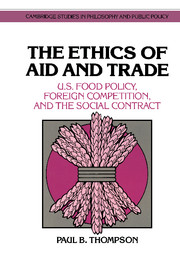Book contents
- Frontmatter
- Contents
- Acknowledgments
- Introduction: Of cabbages and kings
- 1 The food weapon and the strategic concept of food policy
- 2 The Bumpers Amendment
- 3 Does helping foreign industries violate a basic principle of government?
- 4 International agricultural assistance and the interests of U.S. agriculture
- 5 The trading state and the social contract
- 6 Humanitarianism, hunger, and moral theory
- 7 Morality and the myth of scarcity
- 8 The time has come, the walrus said, to speak of many things
- Notes
- References
- Index
8 - The time has come, the walrus said, to speak of many things
Published online by Cambridge University Press: 20 May 2010
- Frontmatter
- Contents
- Acknowledgments
- Introduction: Of cabbages and kings
- 1 The food weapon and the strategic concept of food policy
- 2 The Bumpers Amendment
- 3 Does helping foreign industries violate a basic principle of government?
- 4 International agricultural assistance and the interests of U.S. agriculture
- 5 The trading state and the social contract
- 6 Humanitarianism, hunger, and moral theory
- 7 Morality and the myth of scarcity
- 8 The time has come, the walrus said, to speak of many things
- Notes
- References
- Index
Summary
A society in which political claims are analyzed solely as expressions of personal interest will ultimately undercut the institutions that support the formation of sound moral character. If philosophers cannot find a way to show respect for moral and political values with which they have fundamental disagreements, political discourse may be overcome entirely by cynicism. If political cynicism is broadcast by policy analysts, news media, and the politicians themselves, what hope is there that a small coterie of political theorists can cultivate the virtues of citizenship in the population at large? In A Theory of Justice, Rawls emphasized the need for political philosophers to accept a theoretical language that is consistent with the language of politics. Rawls realized that the need to show respect for opposing views extended beyond personal conduct and, indeed, established the secondary need for political philosophy that made conceptual accommodations with a variety of foundational views. Although sections of A Theory of Justice are devoted to clearing the ground for such a political philosophy, the consensual, accommodating theme of that work is in substantial tension with its Kantian themes (Galston, 1982). In subsequent writings Rawls has reemphasized the goal of nonfoundational, consensus-based political philosophy, but Rawls and his critics continue to address the issue in purely theoretical terms. As long as political theorists ignore the rhetoric of politics, the need to respect the terms of consensus in Western politics will remain unmet.
- Type
- Chapter
- Information
- The Ethics of Aid and TradeU.S. Food Policy, Foreign Competition, and the Social Contract, pp. 183 - 210Publisher: Cambridge University PressPrint publication year: 1992

